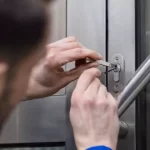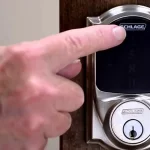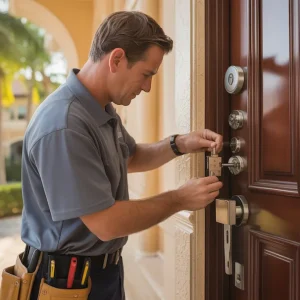Changing your home’s locks is one of the simplest yet most effective steps you can take to improve security. You should change locks on a house whenever you move in, lose keys, or experience a security concern — it can be done DIY or by hiring a locksmith. In this comprehensive guide, we’ll cover everything from choosing the right lock to deciding between rekeying and replacing.

Content
Why You Should Change Locks on a House
Moving into a New Home
When you buy a property, you have no way of knowing who still has keys. Changing house locks after buying ensures that only you and trusted people have access. This is an essential first step in protecting your home and family.
Lost or Stolen Keys
If your keys go missing, it’s impossible to know whether they’ve fallen into the wrong hands. A front door lock replacement or rekeying can restore your peace of mind and prevent unauthorized access.
After a Break-In
A break-in leaves your locks compromised. Intruders may have damaged the mechanism or even taken spare keys. Locksmiths to change locks on a house can ensure your security is restored quickly and professionally.
Upgrading Home Security
Old locks are vulnerable to modern break-in techniques. High-security door locks and smart lock installation can provide better protection, convenience, and integration with home security systems.
Types of Locks for Homes

Deadbolt Locks
Deadbolts offer strong resistance against forced entry. Single-cylinder models operate from inside with a thumb turn, while double-cylinder deadbolts require a key on both sides for extra security.
Smart Locks
Smart lock installation allows you to control access via smartphone, codes, or biometrics. These locks can be paired with cameras or alarms for enhanced monitoring.
Mortise Locks
Mortise locks are known for durability and are common in older homes. They require more complex installation but offer excellent strength.
Keyless Entry Systems
These systems allow access with a code instead of a key. They are ideal for households with multiple residents or rental properties.
High-Security Locks
These locks meet ANSI Grade 1 standards, offering pick and drill resistance for maximum security.
DIY vs. Professional Locksmith

When to DIY
If you’re comfortable with tools, DIY lock change guides can help you save money. You’ll need basic hardware skills and the right tools to remove and install a lock correctly.
When to Hire a Locksmith
A locksmith to change locks on a house is recommended for complex installations, high-security systems, or when you need multiple locks changed quickly.
Cost Comparison
The cost to change locks on a house varies. DIY can be as low as $20–$50 per lock, while professional services may range from $75–$200 per lock.
Benefits of Professional Service
Professionals ensure proper installation, provide warranties, and can advise change locks on a house services that fit your needs.
Step-by-Step Guide to Changing Locks on a House

Removing the Old Lock
Use a screwdriver to remove the screws on the interior side. Pull the lock apart carefully and remove the latch assembly from the door.
Choosing the New Lock
Select a lock compatible with your door’s thickness and bore hole size. Consider high-security door locks or smart lock installation for improved protection.
Installing the New Lock
Follow the manufacturer’s instructions. Install the latch first, then align and secure the exterior and interior assemblies.
Testing and Adjusting
Turn the key or thumb turn several times to ensure smooth operation. Adjust screws or latch plates if necessary.
Common DIY Mistakes and How to Avoid Them
Avoid overtightening screws, misaligning the latch, or skipping compatibility checks before purchase.
Rekeying vs. Replacing Locks
What is Rekeying?
Rekeying house locks involves changing the pins inside the lock so it works with a new key. This is faster and often cheaper than replacing the entire lock.
Pros and Cons of Rekeying
Pros: Cost-effective, quick, maintains existing hardware.
Cons: Doesn’t upgrade lock strength or features.
When to Replace Instead of Rekey
Replace when locks are old, damaged, or you want better security features.
Choosing the Best Lock for Your Home

Security Ratings and Grades
Look for ANSI Grade 1 for maximum security. Grade 2 offers solid protection for most homes.
Brand Comparisons
Popular brands like Schlage, Kwikset, and Yale offer both standard and high-security door locks.
Features to Consider
Consider bump resistance, smart features, weather resistance, and style.
Cost Breakdown and Budget Planning
DIY Lock Replacement Costs
Expect to spend $20–$60 per standard lock. Smart lock installation can cost $150–$300 per unit.
Locksmith Service Costs
Home lock change services typically charge $75–$200 per lock, depending on complexity and urgency.
Smart Lock Costs
Smart locks range from $150 to over $400, depending on brand and features.
Enhancing Home Security Beyond Locks
Door Reinforcement
Use metal strike plates, door jammers, and reinforced hinges to prevent forced entry.
Security Cameras and Alarms
Pair your locks with visible security cameras and alarms for deterrence.
Outdoor Lighting
Motion-activated lighting reduces hiding spots for intruders.
Neighborhood Watch
Active community involvement can help prevent crime.
Maintenance and Care for Locks
Lubrication and Cleaning
Use graphite or silicone-based lubricants to keep locks smooth.
Periodic Security Checks
Inspect locks for wear, rust, or loose components.
Early Signs of Lock Failure
Difficulty turning the key, sticking, or rattling may indicate it’s time for replacement.
Conclusion
Changing locks is a simple yet crucial step in securing your home. Whether you choose DIY lock change or hire a locksmith to change house locks, understanding your options — from rekeying house locks to high-security door locks — ensures better protection for your property. Combine strong locks with additional security measures to keep your home safe and give yourself lasting peace of mind.
Frequently Asked Questions
How often should you change locks?
Whenever you move, lose keys, or experience a break-in.
Can you rekey a lock yourself?
Yes, with the right tools and a DIY lock change guide.
Is it cheaper to rekey or replace?
Rekeying is generally more affordable but doesn’t improve hardware quality.
Do smart locks make homes safer?
Yes, especially when paired with cameras and alarms.
Can you change locks without replacing the door?
Absolutely — lock changes rarely require door replacement.
Is it worth hiring a locksmith?
Yes, for complex jobs, high-security systems, or if you lack the tools or experience.

Ryan Hatch is a master locksmith with 15 years of experience in residential and commercial security. When not writing, he enjoys hiking and tinkering with vintage locks.















